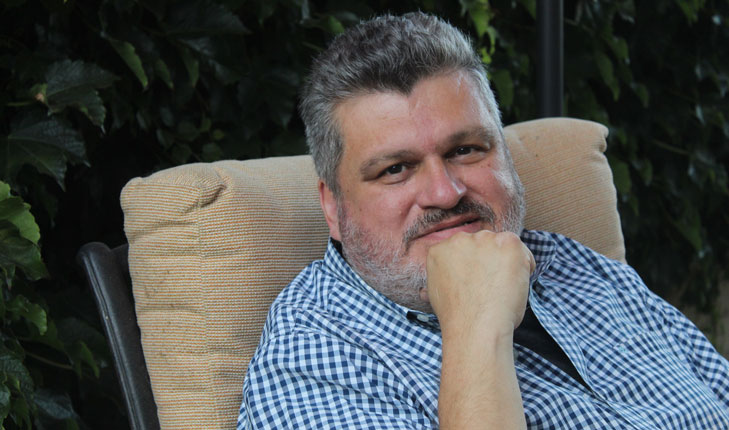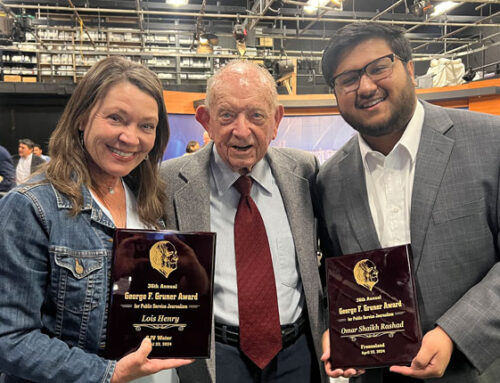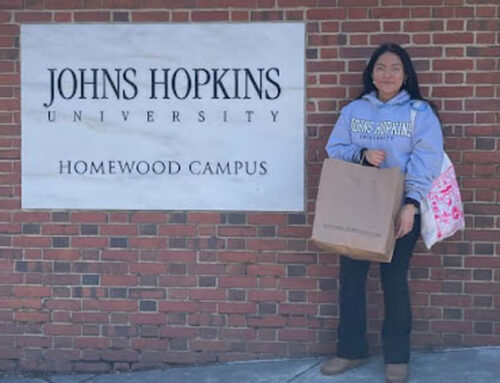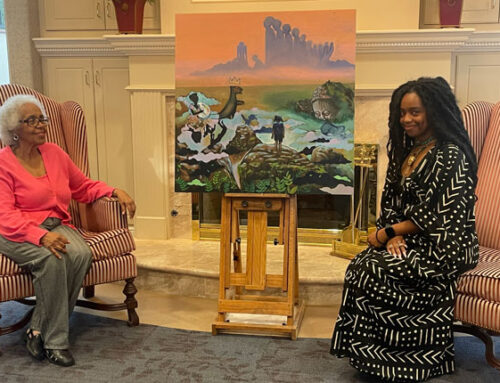Columnist, journalist and storyteller Ruben Navarrette is coming to Fresno State on Oct. 24 through 26, as part of the journalist-in-residence program.
Navarrette is a Central Valley native, independent journalist, writer, columnist, radio host and podcaster. He grew up in Sanger before attending Harvard University as an undergraduate, though he spent his junior year as a visiting student at Fresno State.
At 23, he published his biography, “A Darker Shade of Crimson: Odyssey of a Harvard Chicano.” Navarrette is the most widely-read Latino columnist in the U.S. and the 16th most popular columnist in the country. His column appears twice a week in over 175 newspapers, and he hosts the podcasts “Ruben in the Center” and “Navarette Nation” and writes on his substack.
Navarrette will speak with Fresno State media, communications and journalism students about his personal journey and share his blueprint for surviving and thriving as an independent journalist in the current media environment. He will also present a session on using modern platforms and technologies to sustain an income as a self-contained independent journalist.
Having a close connection to Fresno State, Navarette is excited to be helping its students share their stories and find their voices. The following is an edited conversation with Navarrette ahead of his journalist-in-residence program.
If you were to give yourself a job title, what is it?
My career as a writer began over 34 years ago, but I’ve had difficulty in the past trying to communicate the essence of what I do because I do so many different things. Recently, I realized that all these have one thing in common: storytelling. So my business card says ‘Ruben Navarrette, storyteller.’ It took me three decades to get comfortable referring to myself that way, but I would call myself a storyteller. And from there, it goes on to other things, and I’m mainly defined as a multimedia, multiplatform journalist.
Can you briefly describe your past connection to Fresno State?
My connection to Fresno State began at a very young age, as my dad, who was a cop in the Valley his entire career, would take me with him to Fresno State when he couldn’t find a babysitter for me. I would explore the bowling alley and the arcade, and even though it wasn’t academic, it connected me to the campus and the people there. My experiences didn’t stop there: I performed a poem for the Peach Blossom Festival when I was 11. I recall outreach efforts growing up from Fresno State through the EOP office field trips, and I came back in high school for mock trials, speech and debate and U.N. conferences. Fresno State has always been a jewel of the Valley and has been there for me and my family.
During my junior year of university, I left Harvard for two semesters to be a visiting student here at Fresno State. When I graduated from Harvard, I instructed a course on Chicano studies at Fresno State to students who were not much younger than me. Years later, I was invited back by the Political Science Department at Fresno State and spoke with Patti Doyle, who was the campaign manager for and lifelong friend of Hillary Clinton. Since my youth, I’ve been connected to this university, so I always go back to Fresno State whenever I can.
Why did you choose to return to Fresno State as a visiting student during your junior year of college? How did it differ from your experience at Harvard?
As I was pursuing my junior year, I started hearing from my African American friends, my Black friends. They said they were doing this really interesting experiment. They were taking a year off from Harvard as a visiting student. And instead of going abroad and going to Europe like a lot of people do, they enrolled as a visiting student at a historically Black college. I want to do that, too. But lacking a Latino university, I said, ‘Hey, I got Fresno State.’ So I hatched this plan to take a year off from school just like they had, went down there, and filled out the paperwork that they were to return.
I loved all the courses I was taking at Harvard; I was an American history major, and there was a great variety, but there was one set of courses that the students could not get the faculty, administrators or even the president to consider as worthwhile, which was any course related to Chicano or Latino studies. I wanted to learn about a subject matter that wasn’t available at Harvard, which Fresno State provided. I also missed my family a great deal when I left home, and I was just blessed to be able to go home to my mom and dad. Finally, I also had a stubborn desire to prove that I could go home again and succeed.
Compared to Harvard, the experience of Fresno State was so rich with a real human dimension that has influenced me to this day. It was so different from Cambridge; the students and their experiences were different and grounded. For example, I took a night school course, where I was in class with people who took such late classes because they had worked the entire day. This was a stark contrast compared to Harvard, where students didn’t often have jobs during their entire undergraduate studies and were removed from the experience of working-class struggles.
People will sometimes say things along the lines of, ‘I like Ruben because he’s never lost his ability to connect to people, to the common man.’ That’s because that’s me. I am a common man. I really have both experiences. I have these different worldviews and experiences that came from growing up in the Valley, and my education. I tell people all the time that I’m an alumnus of Fresno State. I’m proud of it because it’s been not only a part of my life, but it was a significant part of my dad’s life as well.
What do you believe is the key to great storytelling?
You really have to capture the imagination of the viewer, listener or reader so that you inspire them to take a certain kind of action. I really believe that people tend to make most decisions based on emotion and based on the story they’re being told, and how this narrative evokes a strong, emotional desire to take action.
You are a freelance writer and independent journalist. What advice would you give to students who are interested in a similar career?
You’ve got to be resilient. It’s a very difficult career, yet incredibly rewarding and fun. If you’re the kind of person who doesn’t want to be stuck in a cubicle doing the same thing every day, and you’re afraid of being bored with your job, then do this because this job is never boring.
It’s good to know exactly what the payoff is because you’re going to see some very hard and difficult moments and lonely moments along the way. This is because, firstly, everything is moving so quickly. The amount of information that one has to digest and process just to do this job effectively is enormous.
Second, we’re a polarized country, because we’re divided, and everybody thinks their opinions are valuable and others’ are nonsensical.
Thirdly, it’s a tough job because you’re constantly competing with other people. The competition is very stiff, and you’re competing for attention and ideas. I would also say not to underestimate the importance of exposing yourself to different points of view and people who are producing content in competition with you.
What can students do to get their foot in the door and find career opportunities as writers and journalists?
You should always be persistent in pursuing what you want. I got a syndicated column when I was in my early 30s, but I had already been applying with syndicates for maybe five or six years before I finally got one, so you can’t be discouraged. Also, my style got better just from sheer practice over the years. It’s important to zero in and find your niche and style. Lastly, look for opportunities like internships or summer jobs in your desired industries.
What is the biggest change in journalism that has occurred from the time you were a student to now?
Journalists have become much more open about their political views. There are people out there who are partisans first and journalists second, they’re much more likely to wear their politics on their sleeve, which is not a small thing because it’s affected the public trust and journalists’ credibility.
I believe that in the future, journalism will become a more individualized and direct communication between the journalist and the viewer. On one side of the coin, old-school media is slowly decaying, but on the other side of the coin, other forms of journalism have exploded onto our media landscape. For example, the podcast world is exploding. There are over 3 million podcasts out there, including some very good ones that do very well and that make a lot of money. Or, for example, the New York Times paper product isn’t doing so well, but the online website is doing very well. Media entrepreneurs out there are also changing the paradigm. People like Bari Weiss, who was once within the op-ed department of The New York Times, resigned in grand fashion, went off and started a substack newsletter that was generating for her about $800,000 a year. One certain aspect of the future of journalism will be more interconnected between journalists and their viewership, which I see as a positive.
Is there anything I missed? Anything you’d like to add?
I’d like to comment on the student population of Fresno State, which is now around 56% Latino. It’s incredible. I’m really excited about this ability to speak to this population and say, ‘Look, America is changing, and America is looking for you to explain these changes. You’re going to feel enormous pressure to be an advocate for this group or that group, to be on the right or the left, but I want you to resist that. I want you to join me in the middle, my podcast is called Ruben in the Center.’
There are all kinds of people from different backgrounds who dislike me as a journalist, but ultimately, telling the truth is your job. It is a whole different thing to be a Latino journalist in America in terms of the stories you cover and your perspective, and it’s important you can forge an independent role than that where you’re still seen as a trustworthy source. It’s a payoff to know that so many people read your writing and trust you as a solid source of news and commentary. That’s very rewarding and part of the reason why I’m excited to be here at Fresno State. This is where I’m from, this is where I connect with and help the students from Fresno State. To close, I’m excited to come back to Fresno State, share some of my stories, and to help students tell their own stories.
(Story by Conor Hustedde, with contributions from Benjamin Kirk.)




